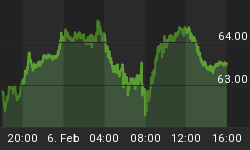The Eurozone's descent into chaos is starting to get repetitive -- though with each iteration the numbers do get scarier.
Back in 2010, for instance, the crisis was already almost a year old and Spain looked like the most likely post-Greece domino. In Why Would Anyone Buy a Spanish Bond? and Why Would Anyone Buy a Spanish Bond? Part 2 the discussion went like this:
Meanwhile, Spain's credit rating is Aa2 (Moody's third-highest) and its 10-year bonds yield 5.2%. Which takes us back to the question that has been nagging euro-skeptics for over a year: Why would anyone buy a Spanish bond? Is it reasonable to lend money for ten years at such a low rate to a country facing this much uncertainty -- in a currency bloc that's under this much stress?
The only conclusion is that when the markets look at Spanish debt they see German debt. In other words, they expect Greece to be bailed out via a German guarantee of its debt, and they expect this deal to then be extended to Spain. That's not unreasonable, given the other options.
Here we are a year later, Greece is still imploding, and Spain (along with Italy) looks like a logical next victim. Automatic Earth just published a good explanation of why this is so, noting among other things that Spain's total (i.e. public and private) debt is almost as high as a percent of GDP as that of the US, which is to say catastrophically high, and its real estate market has imploded while its banks have yet to take the related losses.
Last week the market demanded a 7% yield on new 10-year Spanish government bonds, up from 5% a year ago. Yet the bonds did sell, which once again raises the question of why anyone would buy such paper. For an investment bank or broker, loading up on these bonds risks the fate of MF Global, which was destroyed not by exotic derivatives but by the drying up of funding sources when it was revealed that it held a lot of European sovereign debt.
Even if you insure such bonds with credit default swaps you're no more "hedged" than the holders of Greek debt who "voluntarily" accepted a 50% haircut last month, without triggering the insurance.
So why do it? Two reasons. First, there's not much else to do with large amounts of cash if you need a positive nominal return. Say you're a pension fund that has promised plan beneficiaries a ludicrous 8% annual return. Where else are you going to put your capital? Brazil or China maybe, but that would be hard to defend if it goes wrong. And you can't own only US Treasuries, since they don't yield enough and in any event your trustees would wonder why they were paying you to make such timid and simplistic decisions.
Second, as noted above, if you assume Spain and Italy are too big to fail, as everyone says they are, then Germany will have no choice eventually but to bail them out. Whether this happens through direct "foreign aid", loan guarantees or bond purchases by the European Central Bank, the net effect is to turn Spanish and Italian bonds into German bonds.
That will degrade Germany's balance sheet, of course, but maybe not catastrophically. Lending to a less than AAA Germany might still, so goes the buyer thought process, be a good move at 7%.
So the question then becomes, what will Germany look like when it's responsible for the rest of Europe's debt. Put another way, what would Europe's average interest rate be if everyone was responsible for everyone else's debt? We won't know the answer, of course, till we get there, but 7% seems like way too little compensation for the stress of this journey.















